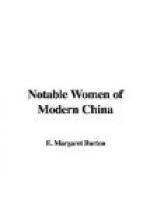She was a great favourite with both faculty and students. One of her fellow students shall tell of the impression she made: “Those who were at Monnett Hall at any time from 1884 to 1887 will remember a dainty little foreign lady, a sort of exotic blossom, whose silk-embroidered costumes, constructed in Chinese fashion, made her an object of interest to every girl in college. This was Dr. Hue King Eng, who came to prepare for her life work. Gentle, modest, winning, her heart fixed on a goal far ahead, she was an example to the earnest Christian girl and a rebuke to any who had self-seeking aims.”
Another, looking back to her college days, and to the college life of Hue King Eng, “or, as she was familiarly and lovingly called, King Eng,” writes, “She was so sweet and gracious, so simple in her faith and life, so charitable, that you felt it everywhere. I shall never forget standing in the hall one day with her and another girl, when a young man delivered some books. I asked his name. The young lady gave it, a well known name, and added that he had very little principle, or character. King Eng spoke up at once, and calling the other girl by name said, ’Yes, but his parents are fine people.’”
The King’s Daughters’ Society was organized during King Eng’s stay at Ohio Wesleyan, and ten groups, of ten girls each, were formed among the students of Monnett Hall. King Eng, who was the leader of one of these groups, proposed that each girl in it should earn enough money to buy one of the King’s Daughters’ badges, and that they should be sent to some of the girls in the Foochow school, that they too might organize a society. She was eager that the girls should not only give the badges, but should earn them by their own efforts, that they might thus show the Chinese girls that American students did not consider any kind of work beneath them, but counted it an honour to serve their Master in any way possible.
During the April of King Eng’s first year at Ohio Wesleyan University, special meetings were held in connection with the Day of Prayer for Colleges, one of them a large chapel service at which the president of the college and the preceptress spoke. The report of this meeting shows that King Eng did not wait until her return to China to begin active efforts to win others to the Christian life. “At the close of an address by Miss Martin, the preceptress, there stepped forward upon the rostrum our little Chinese student, Miss Hue King Eng, who, dressed in her full native costume, stood gracefully before these six hundred young men and women while she witnessed to the saving power of Christ.... The following evening, at our earnest revival service in the chapel of the ladies’ boarding hall, there knelt the Chinese girl at the side of her American sister, helping her to find the Saviour; and the smile of gladness on her countenance at the closing of the meeting told the joy in her heart because her friend was converted. The faith of many has been made stronger by hearing the testimony of Miss Hue.”




